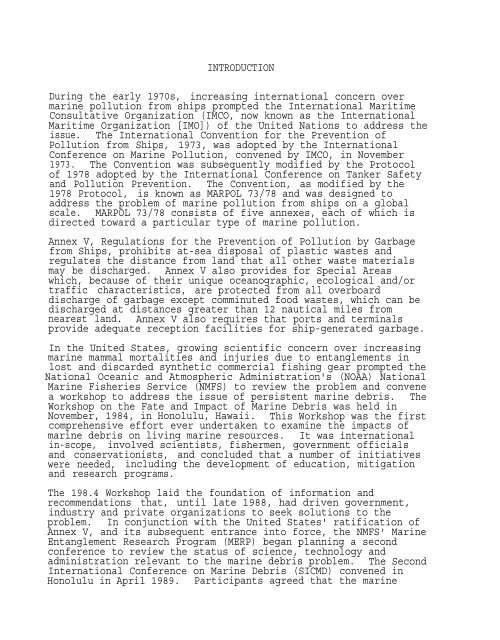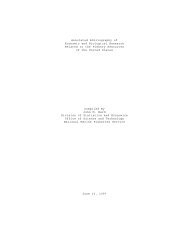Poster abstracts and manuscripts from the Third International ...
Poster abstracts and manuscripts from the Third International ...
Poster abstracts and manuscripts from the Third International ...
Create successful ePaper yourself
Turn your PDF publications into a flip-book with our unique Google optimized e-Paper software.
INTRODUCTION<br />
During <strong>the</strong> early 1970s, increasing international concern over<br />
marine pollution <strong>from</strong> ships prompted <strong>the</strong> <strong>International</strong> Maritime<br />
Consultative Organization (IMCO, now known as <strong>the</strong> <strong>International</strong><br />
Maritime Organization [IMO]) of <strong>the</strong> United Nations to address <strong>the</strong><br />
issue. The <strong>International</strong> Convention for <strong>the</strong> Prevention of<br />
Pollution <strong>from</strong> Ships, 1973, was adopted by <strong>the</strong> <strong>International</strong><br />
Conference on Marine Pollution, convened by IMCO, in November<br />
1973. The Convention was subsequently modified by <strong>the</strong> Protocol<br />
of 1978 adopted by <strong>the</strong> <strong>International</strong> Conference on Tanker Safety<br />
<strong>and</strong> Pollution Prevention. The Convention, as modified by <strong>the</strong><br />
1978 Protocol, is known as MARPOL 73/78 <strong>and</strong> was designed to<br />
address <strong>the</strong> problem of marine pollution <strong>from</strong> ships on a global<br />
scale. MARPOL 73/78 consists of five annexes, each of which is<br />
directed toward a particular type of marine pollution.<br />
Annex V, Regulations for <strong>the</strong> Prevention of Pollution by Garbage<br />
<strong>from</strong> Ships, prohibits at-sea disposal of plastic wastes <strong>and</strong><br />
regulates <strong>the</strong> distance <strong>from</strong> l<strong>and</strong> that all o<strong>the</strong>r waste materials<br />
may be discharged. Annex V also provides for Special Areas<br />
which, because of <strong>the</strong>ir unique oceanographic, ecological <strong>and</strong>/or<br />
traffic characteristics, are protected <strong>from</strong> all overboard<br />
discharge of garbage except comminuted food wastes, which can be<br />
discharged at distances greater than 12 nautical miles <strong>from</strong><br />
nearest l<strong>and</strong>. Annex V also requires that ports <strong>and</strong> terminals<br />
provide adequate reception facilities for ship-generated garbage.<br />
In <strong>the</strong> United States, growing scientific concern over increasing<br />
marine mammal mortalities <strong>and</strong> injuries due to entanglements in<br />
lost <strong>and</strong> discarded syn<strong>the</strong>tic commercial fishing gear prompted <strong>the</strong><br />
National Oceanic <strong>and</strong> Atmospheric Administration's (NOAA) National<br />
Marine Fisheries Service (NMFS) to review <strong>the</strong> problem <strong>and</strong> convene<br />
a workshop to address <strong>the</strong> issue of persistent marine debris. The<br />
Workshop on <strong>the</strong> Fate <strong>and</strong> Impact of Marine Debris was held in<br />
November, 1984, in Honolulu, Hawaii. This Workshop was <strong>the</strong> first<br />
comprehensive effort ever undertaken to examine <strong>the</strong> impacts of<br />
marine debris on living marine resources. It was international<br />
in-scope, involved scientists, fishermen, government officials<br />
<strong>and</strong> conservationists, <strong>and</strong> concluded that a number of initiatives<br />
were needed, including <strong>the</strong> development of education, mitigation<br />
<strong>and</strong> research programs.<br />
The 198.4 Workshop laid <strong>the</strong> foundation of information <strong>and</strong><br />
recommendations that, until late 1988, had driven government,<br />
industry <strong>and</strong> private organizations to seek solutions to <strong>the</strong><br />
problem. In conjunction with <strong>the</strong> United States' ratification of<br />
Annex V, <strong>and</strong> its subsequent entrance into force, <strong>the</strong> NMFS' Marine<br />
Entanglement Research Program (MERP) began planning a second<br />
conference to review <strong>the</strong> status of science, technology <strong>and</strong><br />
administration relevant to <strong>the</strong> marine debris problem. The Second<br />
<strong>International</strong> Conference on Marine Debris (SICMD) convened in<br />
Honolulu in April 1989. Participants agreed that <strong>the</strong> marine
















